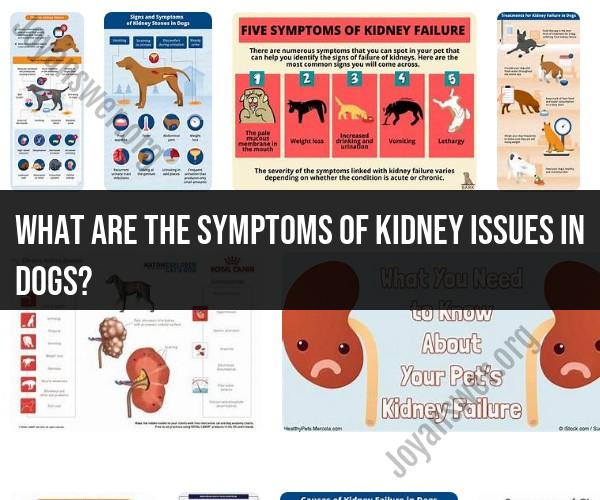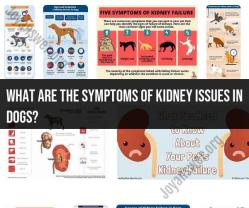What are the symptoms of kidney issues in dogs?
Kidney issues in dogs can range from mild to severe and may indicate underlying kidney disease or other health problems. It's important to be aware of the warning signs and symptoms of kidney issues in dogs so that you can seek veterinary care promptly. Common symptoms of kidney issues in dogs include:
Increased Thirst and Urination (Polydipsia and Polyuria):
- Dogs with kidney problems often drink more water than usual (polydipsia) and urinate more frequently (polyuria). This is because the kidneys are less effective at concentrating urine.
Decreased Appetite:
- A decreased appetite or refusal to eat is a common early sign of kidney issues in dogs. This may be accompanied by weight loss.
Vomiting:
- Dogs with kidney problems may vomit, which can be a result of nausea or the accumulation of waste products in the body.
Lethargy and Weakness:
- Affected dogs may become lethargic, tired easily, and show reduced activity levels.
Bad Breath (Halitosis):
- Kidney disease can lead to an ammonia-like odor on the dog's breath, often described as "uremic" or "urine-like."
Mouth Sores and Ulcers:
- Oral ulcers or sores can develop in dogs with kidney issues, making it painful for them to eat.
Dehydration:
- Dehydration can occur due to increased water loss through excessive urination. Signs of dehydration include sunken eyes, dry gums, and loss of skin elasticity.
Poor Coat Condition:
- Dogs with kidney problems may have a dull, unkempt, or unhealthy-looking coat.
Pale Gums:
- Pale or white gums can be a sign of anemia, which can be associated with kidney issues.
High Blood Pressure (Hypertension):
- Kidney disease can lead to hypertension in dogs. Symptoms may include disorientation, blindness, or seizures.
Changes in Urine Color and Consistency:
- Dogs with kidney issues may produce urine that is abnormally colored (e.g., dark or bloody) or have changes in urine consistency.
Swelling (Edema):
- Fluid retention or swelling, often seen as puffiness in the face or limbs, can occur in dogs with advanced kidney disease.
It's important to note that some dogs with kidney issues may not exhibit noticeable symptoms until the disease is advanced. Routine veterinary check-ups and blood tests are essential for early detection. If you observe any of these symptoms in your dog, especially if they persist or worsen, consult your veterinarian promptly. Early diagnosis and appropriate treatment can help manage kidney issues and improve your dog's quality of life.
Kidney Issues in Dogs: Recognizing Symptoms and Seeking Care
Kidney disease is a common condition in dogs, especially as they age. It can be caused by a number of factors, including infections, toxins, and genetic disorders.
The symptoms of kidney disease in dogs can vary depending on the severity of the disease and the underlying cause. However, some common symptoms include:
- Increased thirst and urination
- Weight loss
- Loss of appetite
- Lethargy
- Vomiting and diarrhea
- Bad breath
- Pale gums
- Mouth ulcers
- Seizures
If you notice any of these symptoms in your dog, it is important to see a veterinarian right away. Kidney disease is a serious condition, but it is often treatable if caught early.
Early Warning Signs of Kidney Problems in Canine Companions
Some early warning signs of kidney problems in dogs include:
- Increased thirst and urination
- Weight loss
- Loss of appetite
- Lethargy
If you notice any of these early warning signs, it is important to have your dog checked by a veterinarian. Early detection and treatment can help to slow the progression of kidney disease and improve your dog's prognosis.
Managing Renal Health: Understanding and Addressing Kidney Symptoms in Dogs
The treatment for kidney disease in dogs depends on the underlying cause and the severity of the disease. In some cases, medication may be prescribed to help manage the symptoms of kidney disease and slow the progression of the disease. In other cases, more aggressive treatments, such as dialysis or kidney transplant, may be necessary.
In addition to medical treatment, there are a number of things that you can do at home to help manage your dog's kidney disease. These include:
- Providing your dog with fresh, clean water at all times.
- Feeding your dog a high-quality, low-protein diet.
- Avoiding foods that are high in phosphorus and potassium.
- Encouraging your dog to exercise regularly.
- Monitoring your dog's weight and general health closely.
By working with your veterinarian and following their recommendations, you can help your dog to live a long and happy life with kidney disease.
Here are some additional tips for managing renal health in dogs:
- Control blood pressure. High blood pressure can damage the kidneys over time.
- Treat infections promptly. Infections can put additional stress on the kidneys.
- Monitor blood creatinine and BUN levels. These blood tests can help to track the progression of kidney disease.
- Provide supportive care. This may include fluid therapy, dietary supplements, and medications to control vomiting and diarrhea.
If you have any questions or concerns about your dog's kidney health, be sure to talk to your veterinarian.





